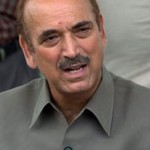NEW DELHI, May 18:In the wake of infants’ deaths in  a Srinagar hospital, Union Minister for Health and Family Welfare, Ghulam Nabi Azad today lamented the slow progress in opening training schools for nurses in Jammu and Kashmir.
a Srinagar hospital, Union Minister for Health and Family Welfare, Ghulam Nabi Azad today lamented the slow progress in opening training schools for nurses in Jammu and Kashmir.
“Jammu and Kashmir has been sanctioned 20 Auxiliary Nurse and Midwives (ANM) and General Nursing and Midwifery (GNM) Schools in the past three years, but I have to say this with regret that the progress on this has been very slow,” Azad, a former Jammu and Kashmir Chief Minister, said.
He was replying to a supplementary by Hassan Khan (Ind) during Question Hour on deaths of 358 children in two months in the State-run G B Pant Hospital in Srinagar. Khan said an inquiry had revealed that the high rate of infant deaths was due to lack of nurses in the State Government hospital.
“Centre extends facilities to the State Governments, but it is up to them on how to benefit from it. What can one do if they choose not to benefit from it,” Azad said, adding “we have sanctioned ANM and GNM Nursing Schools and even sanctioned money. We (Centre) cannot build the schools, they have to be built by the State Governments”.
The Minister admitted that there was shortage of ANM and GNM training schools in areas where there was shortage of such staff. Azad said for the first time the Centre had sanctioned 269 ANM and GNM schools for under served areas.
He said that Government is planning to make a one-year stint in rural India compulsory for MBBS doctors as its incentive scheme for the medicos has drawn virtually no response.
Government had launched a 50 per cent reservation in post-graduate courses for MBBS doctors who opt for a three-year rural stint after their graduation, but found no takers, Azad said, adding those MBBS students who do one year of rural service would get 10 marks as additional weightage while those who did three years in the country’s most backward areas would get 30 marks.
“But, I say it with regret that our doctors have decided not to go to the rural areas. Nobody has come forward to avail of the incentives offered by the Government,” he said, adding Government was in discussion with the Medical Council of India for changing the policy and make it mandatory for doctors to serve in rural areas for one year.
In reply to another supplementary, Azad said medical degrees awarded by colleges in the US, Canada, Britain, Australia and New Zealand were recognized by the Government. However, as per a Supreme Court directive, students studying in other countries will have to undergo tests conducted by the National Board of Examinations before being allowed to practice in the country. Azad said he had visited some countries and found 800 to 1,000 students in a single classroom.
In response to another supplementary, Azad admitted that while perusing the MCI registry it was found that some doctors were registered in three States and there was no record to show whether the medical practitioners had retired or were actually practising.
“Even the figure of 8.4 lakh registered medical practitioners that I have said in the written reply will have to be revised,” he said, adding these shortcomings were noticed during a meeting with MCI officials.
“The MCI has now decided to maintain a live registry wherein one person will not be able to register twice,” he said, adding that efforts were being made to identify active medical practitioners.
Currently, Azad said, there was no record of active medical practitioners as there was no provision to check whether a doctor had retired or settled abroad.
The Minister said as per information available in the Annual Report of the Medical Council of India for 2010-11, the total number of registered medical practitioners in the country was 8,40,130 as on March 31, 2011.
The Indian Medical Register maintained by the MCI is revised from time to time on the basis of information received from the State Medical Councils, Azad said. (AGENCIES)
Trending Now
E-Paper

